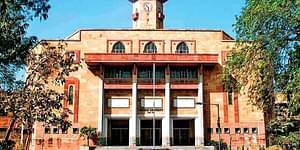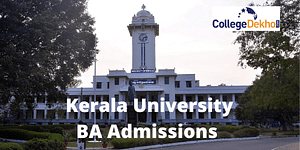BA Kannada Syllabus & Subjects 2024
BA Kannada Syllabus & Subjects Overview
BA Kannada syllabus covers a detailed study of its language, culture, and literature as part of the programme. Prose, poetry, literary genres, drama, literature from prehistoric times to the modern era, and evaluating its literary works are among the BA Kannada subjects the programme usually covers. In addition, the grammar, phonetics, and linguistics of the Kannada language are taught to students, along with its heritage and evolutionary change. Elective courses on film studies, Kannada folklore, and current state issues may also be included in the course curriculum. The BA Kannada course curriculum strives to develop students' research and critical thinking abilities while providing them with an exhaustive knowledge of Kannada literature.
Further, the BA Kannada syllabus & subjects provide candidates with a knack for the different facets of Kannada culture and the language proficiency needed to speak in it. The BA Kannada course is perfect for students who want to work in the media and communication industry or who want to pursue careers in editing, research, teaching, writing, or other related fields. The best approach to learning about the language, literature, and culture of this language is to enrol in this programme. To be eligible for this, students must have completed their 10+2 with at least 50% aggregate marks from a recognised board. The purpose of this page is to help applicants gain a deeper understanding of the topics they will study during the course by providing critical information about the BA Kannada syllabus and subjects.
Table of Contents
- BA Kannada Syllabus & Subjects Overview
- BA Kannada Year Wise Syllabus
- BA Kannada Subjects
- BA Kannada Common Subjects for All Semester
- BA Kannada Optional Subjects
- Syllabus for BA Kannada Distance Programs
- BA Kannada Entrance Exam Syllabus
- BA Kannada Important Books
- BA Kannada Course Structure
- FAQs about B.A. Kannada Syllabus
BA Kannada Year Wise Syllabus
Given that the course duration is three years, the BA Kannada syllabus is divided into a total of six semesters i.e., two semesters a year. Candidates can check whether their chosen academic discipline is provided by downloading the BA Kannada syllabus and subjects brochure from their preferred university's official website before applying. Furthermore, the curriculum offers both core and elective courses, the latter of which may differ from one institution to another. The following is a discussion about the semester-wise BA Kannada syllabus that students can use for reference.
BA Kannada 1st Year Syllabus
The following table highlights the semester-wise BA Kannada syllabus for 1st year:
| Semester 1 | Semester 2 |
|---|---|
| Medieval Kannada Literature-I | Medieval Kannada Literature-II |
| Cultural History of Kannada-I | Cultural History of Kannada-II |
| History of Kannada Literature I | History of Kannada Literature II |
BA Kannada 2nd Year Syllabus
The following table highlights the semester-wise BA Kannada syllabus for 2nd year:
| Semester 3 | Semester 4 |
|---|---|
| Old Kannada Literature-I | Old Kannada Literature-II |
| Modern Kannada Literature-I | Modern Kannada Literature-II |
| Cultural History of Kannada-I | Cultural History of Kannada-II |
BA Kannada 3rd Year Syllabus
The following table highlights the semester-wise BA Kannada syllabus for 3rd year:
| Semester 5 | Semester 6 |
|---|---|
| Traditional Kannada Grammar-I | Traditional Kannada Grammar-II |
| Old and Medieval Kannada Literature-I | Old and Medieval Kannada Literature-II |
| Linguistics-I | Linguistics-II |
| Kannada Folk Literature-I | Kannada Folk Literature-II |
BA Kannada Subjects
Projects and assignments are a part of the BA Kannada curriculum, which is intended to provide students with a thorough comprehension of the core and elective courses as well as practical application of those concepts. A candidate's final grades are based on their performance on class tests, attendance, assignments, and presentations, as well as on internal and external assessments. Nearly all institutions and universities provide the below-mentioned BA Kannada subjects:
- Cultural History of Kannada Literature
- Kannada Folk Literature
- Old and Medieval Kannada Literature
- Traditional Kannada Grammar
BA Kannada Common Subjects for All Semester
BA Kannada courses that have a blend of Linguistics, Sociology, Indian Culture, Kannada Language and Literature, History, Philosophy, and Literature are called common subjects. Often included in the curricula of the most prestigious colleges providing this degree, these are commonly referred to as the core subjects. The common subjects for the BA Kannada course for all semesters are listed below:
- Medieval Kannada Literature
- Old Kannada Literature
- Traditional Kannada Grammar
- Linguistics
- Modern Kannada Literature
- Old and Medieval Kannada Literature
- History of Kannada Literature
BA Kannada Optional Subjects
Optional subjects for the BA Kannada are also termed electives. These are complementary elective courses that usually differ from one university to another. Students can choose to study such subjects as a part of their programme, which in return, adds to their credits. Based on their interests in the subject or willingness to build a professional career in the foreseeable future, candidates can decide on elective subjects as per the list provided by their desired institution.
Students should also check out the syllabus/subject page of their desired university to see whether their preferred elective is offered. The following is a brief list of BA Kannada optional subjects students can use to get an idea about the type of electives they may be offered at their preferred institution. It is referenced from the Kannur University official website’s BA Kannada syllabus and subjects page. Below-mentioned pointers discuss the same:
- Complementary Elective Course I Folk Literature (Semester I)
- Complementary Elective Course II Kannada Journalism and Translation (Semester II)
- Complementary Elective Course III Cultural History of Karnataka (Semester III)
- Complementary Elective Course IV Inscriptions (Semester IV)
- Generic Elective course — History Social reform movements in Kerala (Semester V)
Syllabus for BA Kannada Distance Programs
The BA Kannada distance course syllabus provides students with the contemporary and grammatical knowledge of one of the oldest languages in the world. More than 40 million Indians speak it, making it the seventh most popular language in the country with a rich literary heritage and cultural background. For the distance programme, the syllabus and course duration remain nearly the same. The pointers mentioned below provide a brief overview of the syllabus for BA Kannada distance programs:
- Cultural History of Kannada
- Cultural History of Karnataka
- History of Kannada Literature
- Kannada Folk Literature
- Linguistics
- Medieval Kannada Literature
- Modern Kannada Literature
- Old and Medieval Kannada Literature
- Old Kannada Literature
- Traditional Kannada grammar
BA Kannada Entrance Exam Syllabus
Some institutions, universities, and even states could conduct entrance exams for admission to the BA Kannada course. Candidates can find a detailed overview of the course curriculum and syllabus, which may cover a range of subjects. The BA Kannada entrance exam syllabus is provided below.
PUBDET Syllabus: The Presidency University Bachelor Degree Entrance Test (PUBDET) exam includes topics such as Basic knowledge in music, theatre and dance, Bengali, Elements of basic philosophy, English, English and basic polity, English and general aptitude, Geography, English and basic scientific aptitude, Hindi, History, Mathematics and English, Reasoning and general knowledge, social awareness, etc.
GBPUAT Syllabus: The GB Pant University of Agriculture and Technology (GBPUAT) entrance exam syllabus includes topics such as Kinetic theory of gases, Applications of the Integrals, Three-dimensional Geometry, Semiconductor diodes, Atoms and Atomic Structure, Preparation and Properties of Hydrocarbons, Elementary study of Plant Physiology, Mendelism, and so on.
CUSAT CAT Syllabus: The Common Admission Test for Cochin University of Science and Technology (CUSAT CAT) includes topics such as Chemical Bonding and Molecular Structure, Chemical Equilibrium, Chemical Kinetics, Chemical Kinetics, Chemical Thermodynamics, Electrochemistry, Electrostatics, Energetic, Extractive Metallurgy, Limit, Continuity and Differentiability, Magnetic Effects of Current and Magnetism, Mathematical Induction, Matrices and Determinants, Oscillations and Waves, Permutations and Combinations, Properties of Solids and Liquids, Sequences and Series, Solutions, and more.
CMRUAT Syllabus: The admission test for CMR University (CMRUAT) includes topics such as Biomolecules, Chemistry in Everyday Life, Communication Systems, Current Electricity, Electrostatics, Hydrocarbons, Kinematics, Mathematical Induction, Oscillations and Waves, Physics and Measurement, Polymers, Sequences and Series, Sets, Relations, and Functions, Solutions, States of Matter, Statistics and Probability, Vector Algebra, etc.
AIEED Syllabus: The All India Entrance Examination for Design (AIEED) includes topics such as Awareness of design principles, Awareness of global issues, Composure, Concepts comprehension, Design related awareness, Focus & clarity, General articulation skills, Lateral thinking & creative problem-solving, and so on.
BA Kannada Important Books
For detailed information and to improve student understanding of a particular topic or subject, students can consult books during their BA Kannada course. A variety of books are available online and in bookstores for this course. The following table highlights some best books for BA Kannada that students can use to thoroughly study the subjects as well as for their reference:
Books Name | Author Name |
|---|---|
A History of Kannada Literature | Edward P Rice |
Kannada Bhasha | K B Venkatesh |
Kannada Kavya | C R Ramamurthy |
Kannada Lakarada | M R Venkatesh |
Kannada Sahitya Charitra | G K Damodar |
Kannada Sahitya Shastra | K Venkatesh |
Kannada Vyakarana | K B Narayana |
Malegalalli Madhumagalu | Kuvempu |
Manku Thimmana Kagga | D V Gundappa |
Marali Mannige | Dr K Shivaram Karanth |
Mookajjiya Kanasugalu | K Shivarama Karanth |
BA Kannada Course Structure
The BA Kannada course structure is designed in such a way that the students get an in-depth understanding of all subjects that are included in the curriculum. Given below is the course structure of BA Kannada:
- Assignments
- Case study
- Class tests
- Core subjects
- Elective subjects
- Internship
- Practical
- VI Semesters
FAQs about B.A. Kannada Syllabus
Is the BA Kannada syllabus for distance education the same as the regular course?
Yes, the BA Kannada syllabus for distance education is nearly the same as the regular course along with the programme duration. It includes both core and elective subjects such as Cultural History of Karnataka, History of Kannada Literature, Kannada Folk Literature, Linguistics, Medieval Kannada Literature, Modern Kannada Literature, Old and Medieval Kannada Literature, Old Kannada Literature, and more.
What are the best reference books to study BA Kannada subjects?
The best reference books to study BA Kannada subjects include the following:
- Mookajjiya Kanasugalu by K Shivarama Karanth
- Marali Mannige by Dr K Shivaram Karanth
- Manku Thimmana Kagga by D V Gundappa
- Malegalalli Madhumagalu by Kuvempu
- A History of Kannada Literature by Edward P Rice
What are the popular BA Kannada project topics?
For students to gain more knowledge and to understand the subject better, the majority of colleges assign projects on certain topics. The list of popular BA Kannada project topics includes the following:
- Aa Na Kru Avara Katha Sahitya
- Adunika Kannada Mahilla Kavyadalli Prathibatneya Nelegallu
- Kannada Sahittyadalli Mahamaranna
- Sudarshan Desaiavara Samgra Sahitya
Is project work a part of the BA Kannada curriculum?
Yes, project work is a part of the BA Kannada curriculum that includes minimum research and hands-on experience about the cultural history of the Karnataka state and its official language. The project and thesis should be submitted together in the sixth semester. During their projects, students will have the opportunity to put their knowledge from the BA Kannada course into practice.
Can I download the BA Kannada syllabus & subjects PDF?
Yes, students can download the BA Kannada syllabus & subjects PDF to get details on specific subject descriptions, subject codes by semester, credit numbers, reference materials, and other information. This can be done by visiting the subject/syllabus page on the university's official website and clicking the 'download PFD' option.
What methodologies and techniques are used to teach BA Kannada subjects?
Some methodologies and techniques that are used to teach BA Kannada subjects include both classroom training and practical sessions. Kannada enthusiasts who wish to take up the language as a profession can take part in this course as it offers a variety of compelling teaching strategies. The following list denotes the same:
- Case Study
- Classroom training
- Group Discussions
- Internship
- Practical sessions
What is the BA Kannada course structure?
The BA Kannada course structure is divided into six semesters that contain both core and elective subjects that train students to improve their communication and interpersonal skills. The following pointers outline the same:
- Case study
- Core subject
- Elective subject
- Internship
- Practical
- VI Semesters
What are the core subjects of BA Kannada?
The core subjects of BA Kannada are compulsory topics that students must take to pass the semester exams. The following pointers list the same:
- Cultural History of Kannada
- Cultural History of Kannada Literature
- History of Kannada Literature
- Kannada Folk Literature
- Old and Medieval Kannada Literature
- Traditional Kannada Grammar
What are the BA Kannada elective subjects?
The list of BA Kannada elective subjects includes topics such as Folk Literature (Semester I), Kannada Journalism and Translation (Semester II), Cultural History of Karnataka (Semester III), Inscriptions (Semester IV), History of Social reform movements in Kerala (Semester V), and more. However, these optional subjects may differ from one semester to the next.
Are the BA Kannada subjects tough to understand?
No, the BA Kannada subjects are not tough to understand provided students have good communication skills and interest to explore the rich heritage of the Kannada state and its language. However, it is a little difficult to learn Kannada by reading grammar books, but you'll have more success by speaking and conversing with people.
What are the BA Kannada subjects for the 6th semester?
The BA Kannada subjects for the 6th semester provide students with an in-depth understanding of traditional Kannada grammar, folk literature, as well as old and medieval Kannada literature. Therefore, the fifth semester only includes part II of each respective subject i.e., Traditional Kannada Grammar II, Linguistics II, Old and Medieval Kannada Literature II, and Kannada Folk Literature II.
What are the BA Kannada subjects for the 5th semester?
The BA Kannada subjects for the 5th semester briefly introduced students to traditional Kannada grammar, folk literature, as well as old and medieval Kannada literature. Hence, the fifth semester only includes part I of each respective subject i.e., Traditional Kannada Grammar I, Linguistics I, Old and Medieval Kannada Literature I, and Kannada Folk Literature I.
What are the BA Kannada subjects for the 4th semester?
The BA Kannada subjects for the 4th semester provide students with an in-depth understanding of both the old and modern Kannada Literature as well as the cultural history of the Kannada state. Therefore, the fourth semester only includes part II of each respective subject i.e., Old Kannada Literature II, Modern Kannada Literature II, and Cultural History of Kannada II.
What are the BA Kannada subjects for 3rd semester?
The BA Kannada subjects for 3rd semester briefly introduce students to both the old and modern Kannada Literature as well as the cultural history of the Kannada state. Therefore, the third semester only includes part I of each respective subject i.e., Old Kannada Literature I, Modern Kannada Literature I, and Cultural History of Kannada I.
What are the BA Kannada subjects for 2nd semester?
The BA Kannada subjects for 2nd semester introduce candidates to an in-depth cultural history of Karnataka and Kannada as well as the study of literature related to it. Hence, the second semester only includes part II of each respective subject i.e., Medieval Kannada Literature II, Cultural History of Karnataka II, and History of Kannada Literature II.
What are the BA Kannada subjects for 1st semester?
The BA Kannada subjects for 1st semester introduce students to a brief cultural history of Karnataka and Kannada as well as the study of literature related to it. Therefore, the first semester only includes part I of each respective subject i.e., Medieval Kannada Literature I, Cultural History of Karnataka I, and History of Kannada Literature I.
Which is the best subject to pursue BA Kannada courses?
The best subjects to pursue BA Kannada courses after 12th grade are Physics, Chemistry, and Mathematics i.e., any subject related to the Science (PCB) stream is best to pursue this programme. As this field is related to the history and culture of the Kannada language, students must be proficient, and communicative in this language and even use some complex wordings.
What is the syllabus of BA Kannada?
The syllabus of BA Kannada incorporates both core and elective subjects such as the Cultural History of Karnataka, Folk Literature, History of Social reform movements in Kerala, Inscriptions, Kannada Journalism and Translation, Linguistics, Medieval Kannada Literature, Modern Kannada Literature, Old and Medieval Kannada Literature, Old Kannada Literature, Traditional Kannada Grammar, etc.
What is the entrance exam syllabus for the BA Kannada course?
The entrance exam syllabus for the BA Kannada course includes topics such as Chemical Kinetics, Chemical Kinetics, Chemical Thermodynamics, Chemistry in Everyday Life, Communication Systems, Current Electricity, Awareness of global issues, Composure, Concepts comprehension, English and basic polity, English and general aptitude, Geography, Semiconductor diodes, Atoms and Atomic Structure, Preparation and Properties of Hydrocarbons, and so on.
Which colleges offer the best curriculum for the BA Kannada course?
Colleges that offer the best curriculum for the BA Kannada course are St Joseph's College, Cauvery College (Kodagu), Sri Manjunath Swamy First Grade College, Anjuman College for Women (Anjuman Hami-e-Muslimeen College), Mahatma Gandhi Memorial College, Madras Christian College, Crossland College, Madhava Pai Memorial College, BESM Arts and Commerce College, Izee Business School, and more.
Do BA Kannada subjects train students to improve their communication and interpersonal skills?
Yes, BA Kannada subjects train students to improve their communication and interpersonal skills as this course may even offer a good prospect to work as a customer service executive. You can also become an interpreter, a journalist, or a trip guide. Regional language experts with the necessary qualifications are sought by many organisations. In addition, you can choose and be hired for a variety of jobs based on your skills and areas of interest.
What are the subjects in BA Kannada?
The subjects in BA Kannada are Medieval Kannada Literature I & II, Cultural History of Karnataka I & II, History of Kannada Literature I & II, Old Kannada Literature I & II, Modern Kannada Literature I & II, Cultural History of Kannada I & II, Traditional Kannada Grammar I & II, Linguistics I & II, Old and Medieval Kannada Literature I & II, and Kannada Folk Literature I & II.
Popular Courses
- Courses
- B.A. Kannada
- Syllabus


















